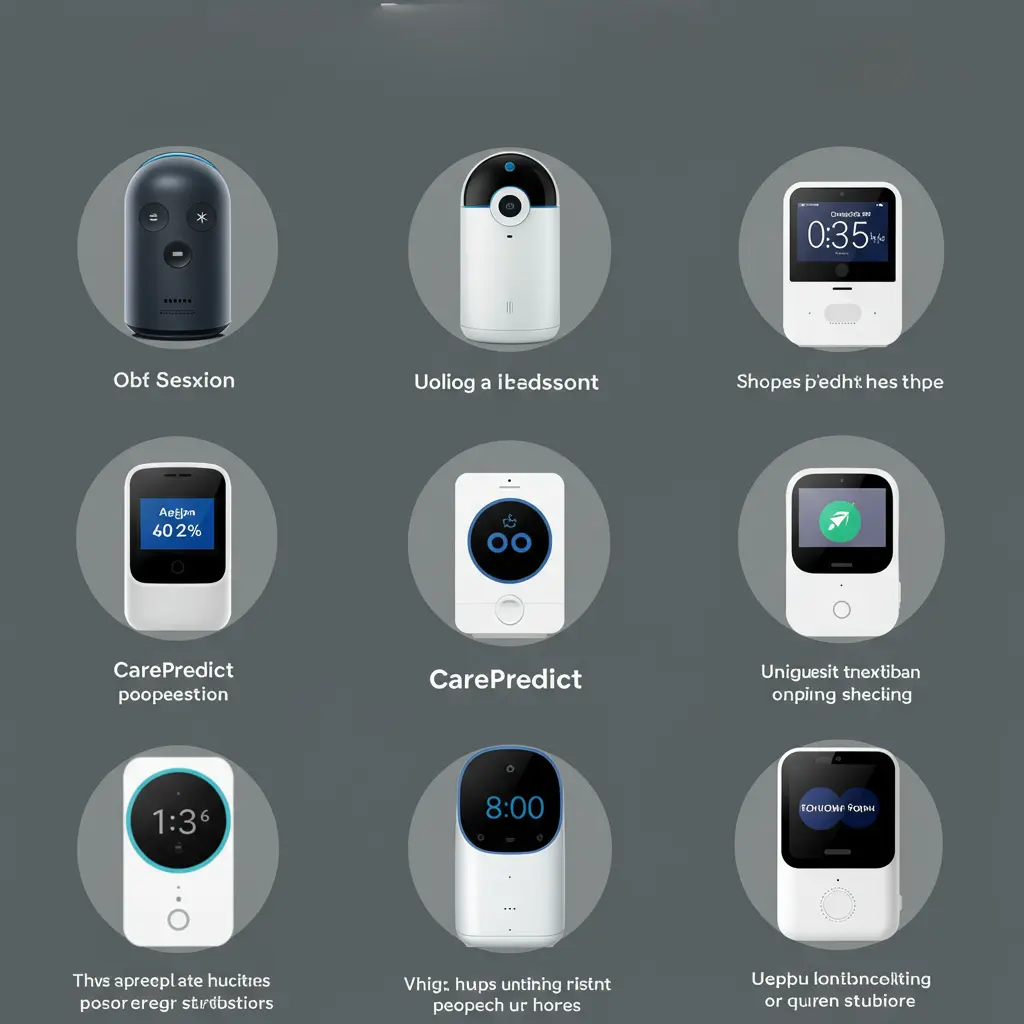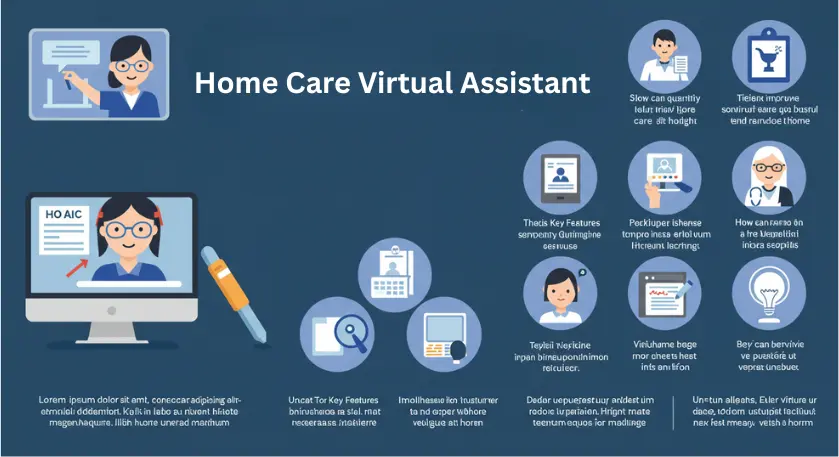Technology is changing how we take care of ourselves and our loved ones in today’s digital environment.
The Home Care Virtual Assistant, a clever tool created to help people with daily duties, particularly those who are elderly, crippled or recovering at home is one of the most inventive innovations in this field.
What Is a Home Care Virtual Assistant?
A home care virtual assistant is a remote or digital assistance system that helps people with everyday living activities and medical requirements while they stay in the convenience of their own homes. This assistant can be a real person working remotely to offer individualized help over the phone, video chat or internet platforms or it can be driven by artificial intelligence (such smart speakers and apps).
Seniors, those with impairments and those recuperating from sickness or surgery can all benefit greatly from these virtual helpers, which provide them a sense of security and independence. A home care virtual assistant can manage a number of duties, including monitoring symptoms, making doctor’s appointments, reminding users to take their medications and even alerting emergency contacts in the event that a health problem is identified.
In order to lessen feelings of loneliness, some AI based assistants also offer companionship by playing music or having simple conversations. Human virtual assistants on the other hand, provide a more individualized touch by managing particular care plans and corresponding with relatives or medical professionals.
A home care virtual assistant essentially serves as a trustworthy assistant, supporting everyday activities, enhancing safety and improving the general quality of life for individuals who require home care while operating silently in the background.
Home Care Virtual Assistant
Key Features and Services
- Medication reminders assist patients in remembering to take their medications on schedule.
- Setting Up Appointments
schedules and reminds people of personal or medical appointments.
- Assistance with Health Monitoring
helps maintain regular health logs, vital signs and symptoms.
- Alerts for Emergencies
able to alert caregivers or family in the event of falls or strange conduct.
- Support for Mental Health and Companionship
Loneliness can be lessened by polite interaction from certain AI or human helpers.
- Management of Domestic Tasks
keeps track of cleaning schedules, finances and grocery lists, among other things.
Who Can Benefit?
For many people, especially those who need daily help but yet want to be independent at home, a home care virtual assistant can be a life-changing support system. Senior adults are among the main demographics that gain from this service. By using virtual assistants for tasks like appointment scheduling, medication reminders and safety warnings, older individuals who live alone can lessen their need on full time caretakers and create a safer living environment.
Another important group is those who have impairments or chronic illnesses. They can keep in touch with medical professionals, check health issues and keep track of symptoms with the aid of a virtual assistant. Long term health management becomes less daunting and more structured with this ongoing support.
Patients recuperating from surgery can also benefit from this technique. They can rely on reminders for medication, therapy sessions and follow up appointments while they are recovering at home, eliminating the need for a physical companion.
Additionally, the peace of mind these helpers provide is beneficial to busy families who are providing remote care for elderly or ill loved ones. They can remain informed and involved even if they are not physically present thanks to real-time updates and emergency notifications.
In summary, a home care virtual assistant can be helpful for anyone who requires daily assistance, health monitoring and increased home security.
Benefits of Using a Home Care Virtual Assistant
- 24/7 Support: This guarantees that assistance is always accessible, even in the absence of family members.
- Cost-effective: Less expensive than hiring in-person caregivers on a full-time basis.
- Lessens the strain on family members and lessens caregiver burnout.
- Enhances Independence: With safety monitoring, elderly can remain in their homes for longer.
Popular Home Care Virtual Assistant Solutions

A number of Home Care Virtual Assistant solutions that address the needs of elderly people, people with disabilities and people recuperating from illness have surfaced in response to the growing demand for in-home care and support. These technologies build intelligent, user friendly systems by fusing voice recognition, artificial intelligence and healthcare integration.
Amazon Alexa with Echo Show, which can be personalized with reminders and healthcare skills is among the most well liked choices. It assists users with daily routines, medication management and even video conversations to family members or caregivers. Similar features are provided by Google Assistant, which is renowned for its smooth interaction with smart home appliances. Voice control is possible for lighting, thermostats and other devices, improving comfort and security.
A wearable technology called CarePredict was created especially for elderly people. It monitors eating, sleeping and movement patterns and notifies caretakers in real time if something seems off. Another voice activated assistant that provides proactive care is LifePod, which starts check ins and reminds users to take their medications, stay hydrated and schedule appointments.
Catalia Health’s Mabu is a robot based virtual assistant that converses with consumers on a regular basis to keep an eye on their mental health and chronic diseases.
Home care is being transformed by these technologies, which make it more responsive, engaging and available to those who need it most.
https://helpsquad.com/home-care-virtual-assistant
Future of Home Care Virtual Assistants
Home care virtual assistants have a promising future thanks to the quick development of machine learning, artificial intelligence and smart home technology. It is anticipated that these assistants will get even more sophisticated, individualized and communicative, revolutionizing the way in home care is provided to the elderly, patients in recovery and those with chronic illnesses.
Virtual assistants will probably have sophisticated emotional identification in the upcoming years, which will enable them to identify stress, mood swings or depressive symptoms and react by alerting caregivers or providing the proper support. The increasing prevalence of integration with wearable health equipment will allow for real time monitoring of vital signs such as blood pressure, heart rate and others, all of which may be linked to the assistant for prompt action if necessary.
Future assistants might also be able to communicate more naturally, comprehend a variety of languages and regional accents and even carry on longer, more meaningful conversations offering not only assistance but also true companionship.
Better integration with healthcare systems is also anticipated, as virtual assistants will automatically plan visits, give medical updates and sync with physicians’ systems.
With the advancement of these technologies, home care virtual assistants will play a crucial role in aging in place by providing safer, more intelligent and more respectable care, enabling people to maintain their independence for extended periods of time while keeping their family informed and connected.
Conclusion:
These assistants are a dependable and effective complement to home care routines because of their Key Features and Services, which range from appointment scheduling and prescription reminders to emergency alarms and companionship. Seniors, patients with chronic illnesses and those recuperating from illness or surgery all benefit from their capacity to automate and customize support.
Beyond convenience, the advantages of using a home care virtual assistant include improved health monitoring, peace of mind, a reduction in the need for full time caretakers and the ability for loved ones to remain informed and connected, even when they are far away.
Users now have access to a variety of tools catered to their individual needs thanks to the availability of numerous popular home care virtual assistant solutions such as Google Assistant, CarePredict, Amazon Alexa and LifePod.
With AI, real time health tracking, and smooth connection with healthcare professionals, the Future of Home Care Virtual Assistants promises even more innovation in the years to come. Home care will continue to be redefined by these developments, becoming more intelligent, secure and human centered.
Q: How does a virtual assistant improve daily life?
A. It offers structure, safety and support helping users manage health and home responsibilities independently.
Q: Which virtual assistants are commonly used for home care?
A. Popular options include Amazon Alexa (with Echo Show), Google Assistant, Care Predict, Life Pod, and Mabu by Catalia Health.
Q: Will these assistants replace human caregivers?
A. Not completely they are designed to assist, not replace, human caregivers by enhancing care and providing 24/7 support when needed.
